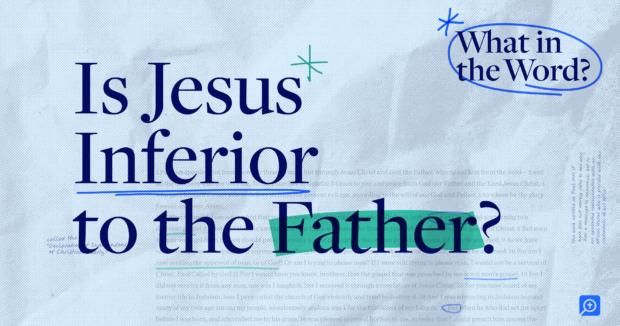Is Jesus actually lower than the Father? On this What in the Word? episode, Kirk E. Miller is joined by theologian Michael Horton to deal with John 14:28, the place Jesus says, “The Father is bigger than I.”
Does this verse undermine perception in Jesus’s divinity and equality with the Father? What did Jesus imply in context—and what have Christians traditionally believed about this passage?
Collectively, Kirk and Mike discover a number of historic interpretations, together with Arianism, everlasting era, the state of Christ’s humiliation, everlasting purposeful subordination, and extra. They conclude with sensible insights for instructing and making use of this deeply theological textual content.
Comply with the present on YouTube, Spotify, Apple Podcasts, and extra.
Particular provides


A Free E-book Only for You
Logos has given away over 5 million free books, empowering Christians globally to check deeply. Get a shiny, new free e-book each month!


Unique Lexham Press Powerful Texts Bundle
Have extra questions in regards to the Bible? Get the 10-volume Lexham Press Powerful Texts Bundle designed completely for followers of What within the Phrase?
Join with us
Prepared to extend biblical literacy? Like and share. To go the additional mile, depart us a evaluation in your most well-liked platform.
Subscribe to get future episodes. (Bonus: We’ll ship you a reduction to make use of in your first buy.)
Thanks for subscribing to Phrase by Phrase!
Use code WORDBYWORD to avoid wasting 10% in your first order.
WORDBYWORD
Copy code
Episode visitor: Michael Horton
Michael S. Horton (PhD, Wycliffe Corridor, Oxford and Coventry College) is the J. Gresham Machen Professor of Systematic Theology and Apologetics at Westminster Seminary California, founder and editor-in-chief of Sola Media, and host on White Horse Inn, a weekly roundtable podcast on theology and tradition.
Dr. Horton has written over thirty books, together with award-winning titles equivalent to Justification (2 vols.), The Christian Faith, and Christless Christianity. His most up-to-date e-book is Shaman and Sage: The Roots of “Spiritual but Not Religious” in Antiquity, the primary of three volumes in his mental historical past of “non secular however not non secular” as a phenomenon in Western tradition.
Episode synopsis
The disputed phrase: “The Father is bigger than I”
This episode addresses a deeply theological and incessantly debated assertion made by Jesus in John 14:28: “The Father is bigger than I.” How ought to Christians interpret Jesus’ swords throughout the broader framework of Scripture and Trinitarian theology, avoiding frequent misunderstandings perpetuated by heresies each historical and trendy?
Setting the context: John’s higher room discourse
Earlier than decoding John 14:28, Mike emphasizes the significance of situating it inside its narrative context—particularly, Jesus’s higher room discourse present in John 14–16. This passage is an element of a bigger sermon Jesus provides to his disciples earlier than his crucifixion and resurrection.
Jesus repeatedly declares his departure and guarantees the approaching of the Holy Spirit. The disciples are confused and discouraged by his phrases, anticipating a triumphant earthly kingdom fairly than a crucified Messiah. Jesus reassures them, explaining that his departure is important for the Spirit to return and for his or her ongoing mission to start.
Heretical & non-Christian interpretations
This assertion—“The Father is bigger than I”—has usually been used to argue that Jesus is one way or the other lesser than God, or not God in any respect. Mike identifies two major teams that misread this verse:
- Arians (traditionally and in trendy types equivalent to Jehovah’s Witnesses), who argue that Jesus is a created being and never totally divine.
- Subordinationists, who declare a hierarchical relationship wherein the Father is eternally superior to the Son and Spirit in rank and authority.
Moreover, this verse is incessantly cited in interfaith apologetics by Muslims and different non-Trinitarian monotheists to problem the Christian doctrine of the deity of Christ.
The orthodox interpretation: incarnation, humiliation, mission
Mike then presents what he and the broader Christian custom affirm because the orthodox interpretation. According to the church fathers on the Council of Nicaea and subsequent Christian thinkers, Jesus’s assertion must be understood in mild of his incarnation and mission—not his everlasting divine nature.
On this view, the “larger than” assertion refers to:
- Jesus’s incarnation because the obedient Son, dwelling beneath the legislation (Gal 4:4).
- His state of humiliation, having “made himself nothing” and taking up human type (Phil 2).
- His financial mission, the Son being despatched by the Father, fulfilling his redemptive objective.
This interpretation affirms that, whereas the Son is the same as the Father in essence (ontologically), he voluntarily assumes a subordinate position in his earthly mission and is inferior to the Father with respect to his humanity. Because the Athanasian Creed states,
It’s essential to eternal salvation that he additionally imagine rightly the incarnation of our Lord Jesus Christ. For the suitable religion is that we imagine and confess that our Lord Jesus Christ, the Son of God, is God and man. God of the substance of the Father, begotten earlier than the worlds; and man of substance of His mom, born on this planet. Good God and excellent man, of an affordable soul and human flesh subsisting. Equal to the Father as touching His Godhead, and inferior to the Father as touching His manhood.
Immanent vs. financial Trinity
A serious theme of the episode is the classical theological distinction between the ontological Trinity and the financial Trinity:
- Immanent (or ontological) Trinity refers back to the the Trinity because it exists in itself, eternally, other than creation. Specifically, every individual of the Trinity is co-equal and co-eternal, actually and equally God.
- Financial Trinity refers back to the Trinity in its relation to creation. This contains the roles every individual of the Godhead assumes in God’s redemptive plan. The Father sends, the Son accomplishes redemption, and the Spirit applies it.
Mike stresses that Jesus’s assertion in John 14:28 must be understood inside this financial framework. The inferiority talked about right here refers back to the Son’s position in redemptive historical past: It isn’t a declare of inferiority in divine essence or everlasting relationship to the Father. As Augustine warned,
Males have erred by a need of cautious examination or consideration of the entire tenor of the Scriptures, and have endeavored to switch these issues that are mentioned of Jesus Christ in response to the flesh, to that substance of His which was everlasting earlier than the incarnation, and is everlasting.
Everlasting purposeful subordination (EFS): a contemporary evangelical debate
Mike critiques a newer theological growth inside evangelical circles referred to as eternal functional subordination (EFS). Proponents of EFS affirm the equality of the Trinity in essence however argue for an eternally present hierarchy of roles, with the Father at all times having had purposeful authority over the Son and Spirit.
In line with Mike, this place:
- Echoes subordinationist logic, even when unintentionally
- Tasks financial roles again into the immanent Trinity
Mike warns that importing human social or familial analogies (e.g., husband and spouse) into Trinitarian theology results in theological error and might distort each doctrine and discipleship.
Everlasting era & the Son’s distinction
In response to the EFS view, Kirk and Mike flip to the historic doctrine of everlasting era, which maintains that:
- The Son is eternally begotten of the Father (e.g., John 1:18)
- This begetting will not be a matter of time however an everlasting relationship
By grounding distinctions among the many divine individuals in supposedly social relations (i.e., authority and submission) fairly than every individual’s distinctive private properties, as discovered of their everlasting relations of origin, EFS undermines the doctrine of everlasting era. Importantly, everlasting era doesn’t suggest inferiority. As a substitute, it secures each the excellence and the equality of the individuals. Specifically, the Son is the whole lot the Father is, besides he’s the Son, not the Father.
Human limitations & Christ’s two natures (the hypostatic union)
The dialog shifts to how Scripture portrays Jesus’s human limitations. Mike affirms the hypostatic union—Jesus is actually God and actually man, two natures united in a single individual.
Scripture displays this union:
- As God, Jesus is omniscient, everlasting, and sovereign
- As man, He grows, learns, experiences starvation, thirst, fatigue, and even ignorance (e.g., “nobody is aware of the day or hour,” Mark 13:32)
These limitations don’t undermine Jesus’s divinity. Relatively, they verify his full humanity, which was vital for him to redeem fallen humanity. So too right here (John 14:28), Jesus could be mentioned to be inferior to the Father.
Sensible theology: why it issues
Mike closes by drawing out the pastoral and devotional implications of this doctrine.
- How we pray: Christians ought to relate distinctly to every individual of the Trinity. We pray to the Father, by the Son, by the Spirit—however we are able to additionally handle the Son and Spirit immediately.
- Trinitarian fellowship: A biblical understanding of the Trinity enriches our communion with God. We don’t relate to a imprecise divine essence however to the Father who sends, the Son who saves, and the Spirit who sanctifies.
- Worship and precision: Mike urges Christians to develop in theological precision—to not be pedantic, however to rightly know and worship the God who has revealed himself as Trinity.
Studying Scripture with theological classes
All through the episode, Mike returns to a key exhortation: interpret Scripture with theological discernment. Heresies come up not from denying the Bible, however from mishandling it—isolating verses from their broader context and theological that means.
Kirk agrees, including that pastors and lecturers ought to give folks the instruments to learn the Bible properly. This contains instructing theological classes equivalent to:
- Ontological vs. financial Trinity
- Everlasting era and procession
- Two natures of Christ
- Mission vs. procession
These distinctions will not be summary—they assist believers perceive troublesome passages and keep away from critical doctrinal errors. As Mike and Kirk affirm, theological readability results in deeper worship, extra trustworthy discipleship, and richer communion with the triune God.
Conclusion: So what’s the purpose?
Jesus’s phrases in John 14:28 will not be a denial of his divinity however a mirrored image of his humble, obedient mission. His departure, removed from being a loss, inaugurates a brand new and larger stage in God’s redemptive plan—the pouring out of the Spirit and the worldwide growth of the church.
Logos values considerate and fascinating discussions on necessary biblical subjects. Nonetheless, the views and interpretations offered on this episode are these of the people talking and don’t essentially replicate the official place of Logos. We acknowledge that Christians might maintain totally different views on this passage, and we welcome various engagement and respectful dialogue.
Source link














